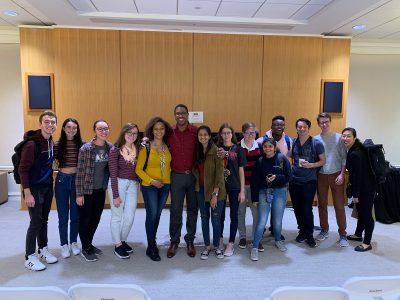Hakeem Oluseyi has many titles: astrophysicist, educator, author, doctor and first-generation college graduate. As he stood in front of a room of Boston University students on Sept. 17, he shared the experiences he had and struggles he overcame in order to build the career he has.

Oluseyi, a distinguished research professor at the Florida Institute of Technology’s Department of Physics and Space Sciences, spoke to students in BU’s Kilachand Honors College about diversity in STEM. In the afternoon, he visited the BU Astronomical Society for a small-group discussion about space, diversity, his future projects and how undergraduates can succeed in the field.
Noah Conley, a senior in KHC, organized the talk with BUAS after hearing Oluseyi would be on campus for the honors college event, according to an email from Linda Doerrer, the Ad Interim Director of KHC.
Doerrer wrote that between the different events, Oluseyi spent about two-and-a-half hours talking to students, who asked him questions about his journey in the field.
Some of the most powerful intellectual experiences occur outside of the classroom, Doerrer wrote and she noted Oluseyi’s talk was one such experience.
“He is passionately interested in exemplifying to talented students that they can succeed,” Doerrer wrote, “even when coming from a background with a lot of challenges.”
Oluseyi grew up in a poor family in Mississippi, with parents who never graduated high school. He attended Tougaloo College in Mississippi for undergrad and headed to Stanford University after graduation to received a master’s and doctorate degree in physics.
Oluseyi said during the BUAS talk that he sees bright students who question whether they’ll be able to go to college. He noted people who attend BU and other universities are exposed to many opportunities.
“You can do whatever you want,” Oluseyi said. “Take advantage of that.”
Since his days at Stanford, Oluseyi has worked in research and education, authored books and appeared in TV shows.
He said he cares about impacting human lives and being intellectually satisfied. In the past, Oluseyi turned down business opportunities, so he could continue core research, he said to BUAS members.
“I never set out to be an educator, I never set out to be a science communicator,” Oluseyi said. “I set out to be a discoverer.”
Oluseyi transitioned out of research to pursue teaching and entrepreneurship and said this path “chose” him.
“I just like the universe and helping people,” he said.
Kera Regan-Byrne, a senior studying astronomy in the College of Arts and Sciences and president of BUAS, attended the BUAS talk and said she thinks it is important that students hear from someone like Oluseyi because it shows them that they are all welcome in science, despite race, gender or other factors.
“We grew up reading science textbooks where it was just rich, white man, rich, white man, rich white man, and then the occasional woman,” Regan-Byrne said. “But overall, the history of most scientific discoveries have … ended up being from white men.”
Regan-Byrne said she hasn’t faced many obstacles as a woman at BU and some of her favorite astronomy classes were with female professors. The greater challenges have been with her peers, she said, who expect her to be an English major, for instance. When she tells them she is an astronomy major, they are shocked.
They will say, “You don’t look like you belong in that field, you don’t look like that’s what you do,” she said.
But Regan-Byrne said she enjoys surprising them.
“[I’m] here because I worked hard … because I took the time to learn,” she said. “I’m here because I want to do great things and I want to become an astrophysicist.”
Oluseyi said his uniqueness in his field comes from being himself and from his culture. He said people like his personality and perspective. He advised students to put themselves out there because “no one else is like you.”
“If you’ve done anything, you’ve done something,” Oluseyi said. “Because most people don’t do something.”

















































































































